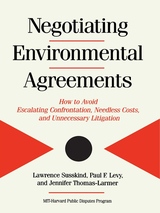
Moore has worked on wide-ranging issues—from radioactive waste storage to loss of traditional grazing lands. More importantly, she has worked with diverse groups and individuals: ranchers, environmental activists, government agencies, corporations, tribal groups, and many more. After decades spent at the negotiating table, she has learned that a case does not turn on facts, legal merit, or moral superiority. It turns on people.
Through ten memorable stories, she shows how issues of culture, personality, history, and power affect negotiations. And she illustrates that equitable solutions depend on a healthy group dynamic. Both the mediator and opposing parties must be honest, vulnerable, open, and respectful. Easier said than done, but Moore proves that subtle shifts can break the logjam and reconcile even the most fiercely warring factions.
This book should be especially appealing to anyone concerned with environmental conflicts; and also to students in environmental studies, political science, and conflict resolution, and to academics and professionals in mediation and conflict resolution fields.

When business leaders, government officials, and other stakeholders come to the table in an environmental, health, or safety dispute, acrimony often results, leading to expensive and time-consuming litigation. Not only does this waste precious resources, but rarely does the process produce the best outcome for any of the parties involved.
For the past five years, the authors of this volume have conducted semi-annual seminars at the Massachussetts Institute of Technology and at Harvard to provide business leaders and regulators with the knowledge and skills they need to more effectively handle environmental, health, and safety negotiations. Their strategy, known as the "mutual gains approach," is a proven method of producing fairer, more efficient, more stable, and wiser results. Negotiating Environmental Agreements provides the first comprehensive introduction to this widely practiced and highly effective approach to environmental regulation.
The book begins with an overview of the mutual gains approach, introducing important concepts and ideas from negotiation theory as well as the theory and practice of mediation. The authors then offer five model negotiations from their MIT-Harvard Public Disputes seminar, followed by a series of real-world negotiated environmental agreements that illustrate the kinds of outcomes possible when the mutual gains approach is employed. A collection of writings by leading experts provide valuable insights into the process, and appendixes offer both instructions for conducting model negotiation sessions and analysis of actual game results from earlier seminars.
This is the only prescriptive text available for the many regulatees and regulators involved in environmental regulatory negotiations each year. Anyone involved with environmental negotiation -- including corporate and public sector managers, students of environmental policy, environmental management, and business management -- will find the book an essential resource.
READERS
Browse our collection.
PUBLISHERS
See BiblioVault's publisher services.
STUDENT SERVICES
Files for college accessibility offices.
UChicago Accessibility Resources
home | accessibility | search | about | contact us
BiblioVault ® 2001 - 2024
The University of Chicago Press









